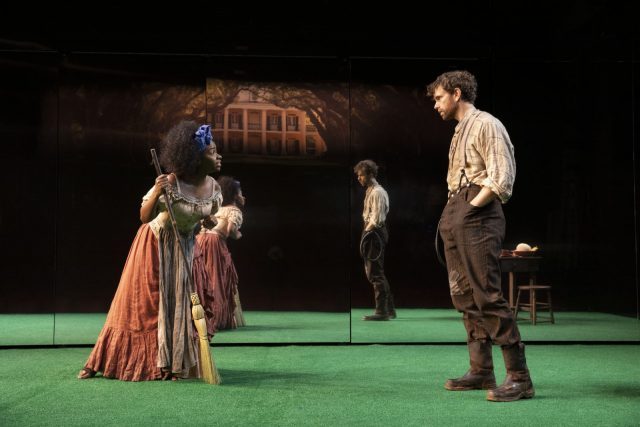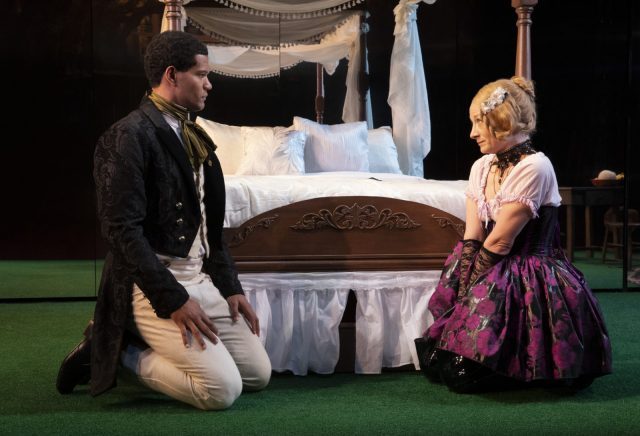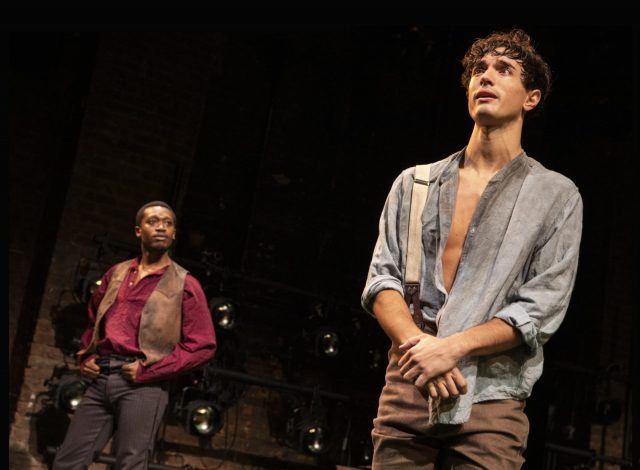
Kaneisha (Teyonah Parris) and Jim (Paul Alexander Nolan) have an unusual relationship in Slave Play (photo by Joan Marcus)
New York Theatre Workshop
79 East Fourth St. between Second & Third Aves.
Tuesday – Sunday through January 13, $79
www.nytw.org
Jeremy O. Harris’s intense Slave Play delves deep into a trio of dangerous sexual interactions defined by race, gender, and power in the Antebellum South as well as today. The story takes place in Virginia on the MacGregor Plantation, which is represented by a large image of the main house behind the audience that is reflected on the mirrored wall across the back of the stage on Clint Ramos’s narrow set, onto which various pieces of furniture are brought on through a doorway at the center and around the sides. The play opens with black slave Kaneisha (Teyonah Parris) sweeping the floor, twerking to Rihanna’s “Work,” when she is caught by her white overseer, Jim (Paul Alexander Nolan). “I ain’t never seen no / ‘negress’ / move like that there before!” Jim says. “Where’d you learn dat? / Thought they beat all the Africa outcha’ll fore we broughtcha up here to MacGregor’s.” Kaneisha responds, “Ya’ll did / try to tear it way from us. / The truth of our bodies? / The way they moved / Our bodies. / Told us it / was / devilish / Our bodies / told us that it won’t / fit / for civ’lized eyes.” Kaneisha expects to be whipped for her actions, but Jim, who tells Kaneisha to address him as “Mista Jim,” not “Massa,” becomes turned on by her instead.

Alana MacGregor (Annie McNamara) wants more than just music from Phillip (Sullivan Jones) in Jeremy O. Harris play (photo by Joan Marcus)
After they depart the stage, a four-poster bed is wheeled on with Alana MacGregor (Annie McNamara), the plantation owner’s wife, who calls for her “mulatto” house servant, Phillip (Sullivan Jones), to play his violin for her. While he wants to play Beethoven, she condescendingly insists on hearing “some of your music. A negro spiritual!” Soon she is appealing for more than just music. The third couple arrives next, Dustin (James Cusati-Moyer), a white indentured servant, and Gary (Ato Blankson-Wood), his black boss. “I’s in charge. / But / that’s what makes you a funny white man. / Ha!” Gary tells him. “Ain’t used to seein’ them allow / no n—a to run they show. / You’s a funny white man.” They end up fighting to Unknown Mortal Orchestra’s “Multi-Love,” until clothes start coming off. With the later addition of facilitators Patricia (Irene Sofia Lucio) and Teá (Chalia La Tour), the second act offers a surprising twist that puts the actions of the first act into a compelling contemporary context, but to say anything further would be doing the play a disservice.

Gary (Ato Blankson-Wood) and Dustin (James Cusati-Moyer) turn the power dynamic inside out in Slave Play at NYTW (photo by Joan Marcus)
Inspired by such films as Ingmar Bergman’s Scenes from a Marriage and Richard Fleischer’s Mandingo, such writings as Hortense J. Spillers’s Mama’s Baby, Papa’s Maybe: An American Grammar Book and José Esteban Muñoz’s Feeling Brown, Feeling Down: Latina Affect, the Performativity of Race, and the Depressive Position, and songs by Rihanna, Slave Play is a hard-hitting look at America’s shameful past, an investigation into slavery, racism, white privilege, and political correctness that will have you laughing nervously as you shift uncomfortably in your seat, the plantation mind-set still all-too-real. Divided into three sections, “Work,” “Process,” and “Exorcise,” the two-hour intermissionless production explores the things we say and don’t say, the demands we make on our partners as well as ourselves. Harris — who also examines what he refers to as “decolonizing desire” in 2016’s water sports; or insignificant white boys and the upcoming Daddy and is actually still a graduate student at Yale — and Obie-winning director Robert O’Hara (Eclipsed, The Continuum) keep the audience rapt but uneasy throughout; when the lights are up, audience members can see themselves reflected in the stage mirror, making them complicit in the shenanigans they are watching, evoking the sexist and racist problems still so prevalent in contemporary society and our psyches, born of America’s original sin, slavery.